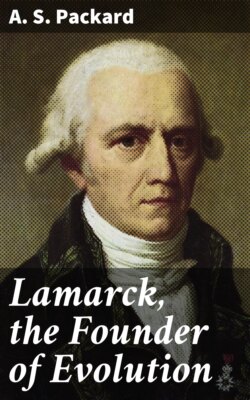Lamarck, the Founder of Evolution

Реклама. ООО «ЛитРес», ИНН: 7719571260.
Оглавление
A. S. Packard. Lamarck, the Founder of Evolution
Lamarck, the Founder of Evolution
Table of Contents
PREFACE
Lamarck, the Founder of. Evolution. His Life and Work
CHAPTER I. BIRTH, FAMILY, YOUTH, AND MILITARY CAREER
FOOTNOTES:
CHAPTER II. STUDENT LIFE AND BOTANICAL CAREER
FOOTNOTES:
CHAPTER III. LAMARCK’S SHARE IN THE REORGANIZATION OF THE JARDIN DES PLANTES AND MUSEUM OF NATURAL HISTORY
FOOTNOTES:
CHAPTER IV. PROFESSOR OF INVERTEBRATE ZOÖLOGY AT THE MUSEUM
FOOTNOTES:
CHAPTER V. LAST DAYS AND DEATH
FOOTNOTES:
CHAPTER VI. POSITION IN THE HISTORY OF SCIENCE; OPINIONS OF HIS CONTEMPORARIES AND SOME LATER BIOLOGISTS
FOOTNOTES:
CHAPTER VII. LAMARCK’S WORK IN METEOROLOGY AND PHYSICAL SCIENCE
FOOTNOTES:
CHAPTER VIII. LAMARCK’S WORK IN GEOLOGY
Lamarck’s Contributions to Physical Geology; his Theory of the Earth
FOOTNOTES:
CHAPTER IX. LAMARCK THE FOUNDER OF INVERTEBRATE PALÆONTOLOGY
FOOTNOTES:
CHAPTER X. LAMARCK’S OPINIONS ON GENERAL PHYSIOLOGY AND BIOLOGY
FOOTNOTES:
CHAPTER XI. LAMARCK AS A BOTANIST
CHAPTER XII. LAMARCK THE ZOÖLOGIST
TABLEAU. Servant à montrer l’origine des differens animaux
FOOTNOTES:
CHAPTER XIII. THE EVOLUTIONARY VIEWS OF BUFFON AND OF GEOFFROY ST. HILAIRE
Étienne Geoffroy St. Hilaire
FOOTNOTES:
CHAPTER XIV. THE VIEWS OF ERASMUS DARWIN
FOOTNOTES:
CHAPTER XV. WHEN DID LAMARCK CHANGE HIS VIEWS REGARDING THE MUTABILITY OF SPECIES?
FOOTNOTES:
CHAPTER XVI. THE STEPS IN THE DEVELOPMENT OF LAMARCK’S VIEWS ON EVOLUTION BEFORE THE PUBLICATION OF HIS PHILOSOPHIE ZOOLOGIQUE
I. From the Système des Animaux sans Vertèbres (1801)
II. Recherches sur l’Organisation des Corps vivans, 1802 (Opening Discourse)
“First Part: Progress in structure of living beings in proportion as circumstances favor them
Modification of the organization from one end to the other of the animal chain
Appendix (p. 141)
On Species in Living Bodies
III. Lamarck’s Views on Species, as published in 1803
IV. Lamarck’s Views as published in 1806.[177]
FOOTNOTES:
CHAPTER XVII. THE “PHILOSOPHIE ZOOLOGIQUE”
The Influence of Circumstances on the Actions and Habits of Animals
“First Law
“Second Law
“On the Feeling of Existence
On the Transportation of the force-producing Movements in the Interior of Animals
“On the Instincts of Animals
“On the Industry of Certain Animals
FOOTNOTES:
CHAPTER XVIII. LAMARCK’S THEORY AS TO THE EVOLUTION OF MAN
“Some Observations Relative to Man
FOOTNOTES:
CHAPTER XIX. LAMARCK’S THOUGHTS ON MORALS, AND ON THE RELATION BETWEEN SCIENCE AND RELIGION
FOOTNOTES:
CHAPTER XX. THE RELATIONS BETWEEN LAMARCKISM AND DARWINISM; NEOLAMARCKISM
“VI. The Adequacy of Neolamarckism
FOOTNOTES:
A BIBLIOGRAPHY OF THE WRITINGS OF J. B. DE LAMARCK[274] 1778–1828
1778
(1805–15)
1783
1784
1785
1788
1790
1791
1792
1794
1796
1797
1798
1799
1800
1801
1802
1802–6
Paris, Mus. Hist. nat. (Ann.) I, 1802
Paris, Mus. Hist. nat. (Ann.) II, 1803
Paris, Mus. Hist. nat. (Ann.) III, 1804
Paris, Mus. Hist. nat. (Ann.) IV, 1804
Paris, Mus. Hist. nat. (Ann.) V, 1804
Paris, Mus. Hist. nat. (Ann.) VI, 1805
Paris, Mus. Hist. nat. (Ann.) VII, 1806
Paris, Mus. Hist. nat. (Ann.) VIII, 1806
1805
1805–1809
1806
1807
1809
(Ces notes ont été relevées sur l’édition de 1809.) 1810–1811
Ann. Mus. Hist. nat., Paris, XV, 1810. pp. 20–26
Ann. Mus. Hist. nat., Paris, XVI, 1810
Ann. Mus. Hist. nat. XVII, 1811
1812
1813
Ann. Mus. Hist. nat., Paris, XX, 1813
Ann. Mus. Hist. nat., Paris, I, 1815
1813–15
Mém. Mus. Hist. nat., Paris, I, 1813. p. 401
Mém. Mus. Hist. nat., Paris, II, 1815
1815–22
1818
1820
1823
1828
Eulogies and Biographical Articles on Lamarck
FOOTNOTES:
INDEX
Отрывок из книги
A. S. Packard
His Life and Work
.....
Of this group Lamarck was facile princeps, as he combined great sagacity and experience as a systematist with rare intellectual and philosophic traits. For this reason his fame has perhaps outlasted that of his young contemporary, Geoffroy St. Hilaire.
The necessities of the Museum led to the division of the chair of zoölogy, botany being taught by Desfontaines. And now began a new era in the life of Lamarck. After twenty-five years spent in botanical research he was compelled, as there seemed nothing else for him to undertake, to assume charge of the collection of invertebrate animals, and to him was assigned that enormous, chaotic mass of forms then known as molluscs, insects, worms, and microscopic animals. Had he continued to teach botany, we might never have had the Lamarck of biology and biological philosophy. But turned adrift in a world almost unexplored, he faced the task with his old-time bravery and dogged persistence, and at once showed the skill of a master mind in systematic work.
.....